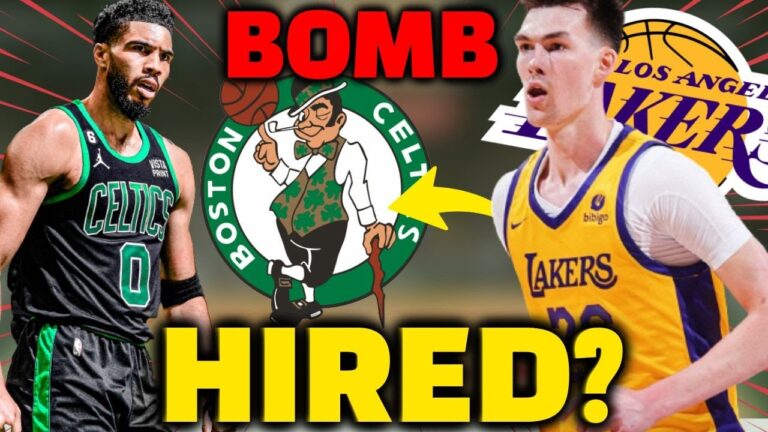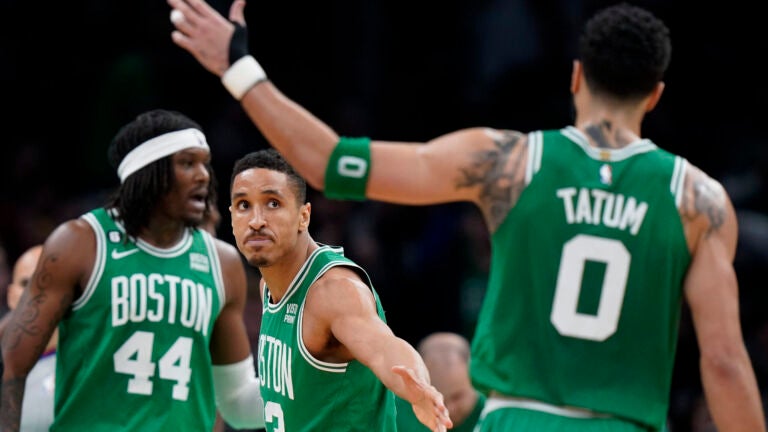On Sunday, Celtics reporters got a surprise visit: President of basketball operations Brad Stevens gave a press conference before the team’s regular-season finale against the Hawks.
After a question about Jaylen Brown’s hand and another about Joe Mazzulla, The Boston Globe’s Adam Himmelsbach asked Stevens a simple-but-pertinent one: Why, exactly, are you volunteering to speak when nobody expected you to do so?
“I asked our media team if they wanted me to talk,” Stevens said with a chuckle. “I’ll probably let the coaches and players do all of the talking in the playoffs, because it’s their show. They deserve that.”
Stevens looks well when he speaks to the media these days — more rested than he did during his final season as the team’s head coach. The role of president of basketball operations suits him — he seems aware of the various narratives around the team, but less beholden to them. When a reporter asked him about the addition of new wing Justin Champagnie, Stevens launched into a lengthy team-building explanation. He hopes Champagnie can turn himself into a useful role player eventually, but for now, the Celtics need to take a swing on a younger prospect who understands he won’t play during the playoffs.
SPORTS NEWS
After all, they haven’t acquired a lot of players like that in recent years.
“We haven’t made a first-round draft pick in a while,” Stevens said with a smile.
Stevens is very intentional with his work and his words. When he speaks to the media, he understands how his message will be interpreted, so he means what he says — offering answers that are candid enough to avoid being cagey.
On Sunday, the biggest topic of conversation was Mazzulla — the team’s former interim coach who was given the keys to the operation full-time in February. Mazzulla bristles when reporters suggest the Celtics have had ups and downs this year (“We did win 70 percent of our games,” he protested on Friday), but with a number of confounding losses to teams like the Rockets, Wizards and Magic which ultimately cost the Celtics the 1-seed, the struggles were undeniable.
Still, it’s hard to overstate the difficulty of Mazzulla’s task when he was initially promoted in September. Previously, his head coaching experience was limited to Fairmont State, an NCAA Division II school where the home court could accurately be described as “intimate.” He spent the offseason preparing to be an assistant coach — presumably with more responsibility after Ime Udoka lost lead assistant Will Hardy to the Jazz (a position Mazzulla also interviewed for), but still mostly a behind-the-scenes actor.
Then Udoka’s suspension hit. Just three days before Media Day and a little over a week before the preseason opener, Mazzulla had to learn how to be an NBA coach under a blinding spotlight.
Mazzulla was no longer simply part of the Celtics’ operation — a sharp-and-relatable basketball voice working to support a head coach by taping a ping-pong paddle to Romeo Langford’s hand. Instead, the Boston Celtics became his show. After PA announcer Eddie Palladino called Jayson Tatum’s name on Opening Night, he would announce “Joe Mazzulla” as the team’s head coach. A video of Mazzulla would play on the TD Garden Jumbotron in front of 17,000 people. ESPN would spend days talking about Udoka and, by proxy, Mazzulla himself. Getting the most out of superstars like Tatum and Jaylen Brown over the course of an 82-game season — and keeping them happy enough to stay in Boston — was now Mazzulla’s task.
The Celtics’ roster also needed quite a bit of injury management. They needed to get Robert Williams healthy, and then keep him healthy while ramping him up. They needed Tatum and Brown to rest, but also to prepare for 40-minute slogs in the postseason. They needed role players to feel comfortable in their roles, but also to remain available down the stretch.



